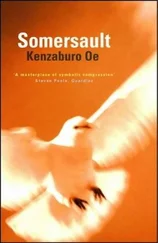Meanwhile, back at the dress rehearsal, a spotlight revealed a stage bare except for two straw mats spread out in the center. Meisuke, the valiant young farmer who led the first uprising, was lying on a futon spread out over the mats. Projected on hanging curtains around him were illuminated images of square columns made from oak, which created the optical illusion of a jail cell. Several young samurai came stamping into this enclosure. Then Meisuke, obviously unwell, launched into a heartfelt plea as the samurai listened with quizzically tilted heads.
“You fellows represent the new fiefdom, and your social standing was undermined by my group’s victory in the uprising. I know you had to find a scapegoat in order to save face with your overlords, but we were always friends off the battlefield, were we not? Yet I was captured and thrown into jail for the crime of having won in combat, fair and square, and you’re keeping me prisoner here even though I’ve fallen ill. What good does that do?”
A young samurai warrior replied: “It’s nothing personal. As you said, we just needed someone to step up and be punished for the insurrection, and you happen to be the leader.”
Then Meisuke said, “But why won’t you let me escape now?”
To which the samurai replied, “The truth is, even if we set you free you’re so ill that you wouldn’t live very long on the outside, much less be able to lead another insurrection. However, try to see our point of view. If we keep you here and let you die in prison, then the old regime will start to believe in and trust us again in spite of our ignominious defeat in the uprising. That will be politically useful to us in the future.”
The group of young samurai turned on their heels and departed. A woman — Meisuke’s mother — had been squatting outside the illusory jail cell, and a despairing Meisuke tearfully appealed to her for help. His mother, who was still very youthful-looking, responded by uttering a line that has become one of the more famous parts of local lore about the uprising: “There’s no need to worry — even if you die, I’ll just give birth to you again.”
The projected images of oaken columns flickered, then disappeared. Meisuke’s mother stood up and, advancing to her son’s bedside, she began to straighten the lapels of his kimono and tidy his bedding. The spotlight trained on Meisuke’s bed began to fade away and the stage was plunged into darkness, signaling a brief break for a scene change.
There was a smattering of tepid applause from the people in the first few rows. I knew what that meant; the disagreement between Unaiko and the opposing faction regarding the reincarnation story had not yet been resolved. The school group, which included the two teachers who had waylaid us behind the shrine, objected strongly to the older version of the folktale in which Meisuke’s mother gives birth to her deceased son again years later (that is, the same spirit in a new body), but Unaiko had refused to yield.
I remembered that when I first told this story to Sakura, she had responded by saying, “I don’t see anything unnatural there. It seems like a perfectly maternal thing to do. Besides, millions of people all over the world believe in reincarnation.”
Not wanting to fuel the controversy, I had glossed over the “rebirth issue” in the script and had written only a few vague lines to suggest the mother’s lovingly solicitous behavior toward her dying son. Of course, I was coming to this project from a long background in novel writing, and I was still in the habit of adding accretional layers to any text by means of multiple rewrites, but one of the bits of conventional wisdom regarding this technique is the idea that if you don’t feel confident about a rewrite, you should completely delete the section in question. That’s what I had done with the section on the reincarnation of Meisuke, but Unaiko had subsequently inserted her own revisions.
As the stage lights came up Masao whispered, “I think the applause just now was for you, Mr. Choko.”
“No,” I replied. “The applause was for Unaiko, for the way her direction brought everything together and gave the play its distinctive shape, and for the trouble the young actors took to learn their lines and the splendid way they delivered them, even in her absence.”
At that moment I caught sight of Asa standing over on the left side of the theater, in the narrow aisle separating the front-row seats from the elevated stage. She was hanging her head in a way that reminded me of the doleful-looking young mother who had been onstage a short while before. My sister didn’t glance in my direction; she seemed to be passively biding her time, waiting for someone to notice her presence.
I got up from where I was sitting, ducked into a space behind the audience seating, and waited there for Asa. On the stage, the play was progressing with a scene in which the members of the second uprising were marching off to battle, led by the possible reincarnation of the late Meisuke (that is, Meisuke II) and the courageous woman who had given birth to both of them.
After a moment my sister appeared beside me and said in a dazed voice, “Three men have kidnapped Unaiko, and they’re holding her prisoner at Daio’s old training camp. Apparently two of the men went there in their own car, while a third kidnapper forced Ricchan to drive another car, with Unaiko and Akari as unwilling passengers. The men ordered one of the young troupe members to warn you that if you notified the police, something terrible would happen to Akari. A bit later I got a phone call from Daio, telling me to share this information with you, and you alone, and instructing me to bring you to the training camp. I told the young actor not to say a word to anyone, so Masao doesn’t even know what’s going on.
“The people at the training camp aren’t asking you to do anything specific, but they want you there as soon as possible. It sounds as if they just want to go over the script and get Unaiko to make some changes. I gather Unaiko is holding her ground even on the improvised sections, telling the other side you approved those portions. Maybe they’re hoping you’ll be able to persuade her to change her mind.
“I’m not really clear about Daio’s role in all of this,” Asa added. “I only know that he seems to be on good terms with Mrs. Koga — Unaiko’s aunt — and her husband, and as we saw the other day, they’ve apparently been acquainted for quite some time. To be honest, I really don’t know whether Daio is friend or foe, but the good news is that the situation doesn’t seem to have escalated to the point where the police would need to be called in.”
2
Asa and I left the theater right away, and after a quick detour to pick up some things at the Forest House, we headed for Daio’s training camp. After a short drive we found ourselves on the far side of a deep valley with a view of the camp, which was built into a sloping hill, and the rolling farmland above it. The terrain looked very familiar to me, even though I hadn’t been here since high school.
It wasn’t dusk yet, but the densely overcast sky had already turned completely dark. We crossed the river on a steel bridge that had replaced the rustic suspension bridge I remembered. On the other side of this bridge there was a carport containing a lightweight truck and a small tractor. A passable road climbed the hill, which probably explained why the cars that had brought Unaiko, Ricchan, and Akari were nowhere to be seen. The only light came from a naked bulb hanging on a lamppost made from a tall, round log.
Two bulky men dressed in suits, who had been standing outside the circle of light, suddenly appeared and gestured to Asa to leave the car behind the carport, where it wouldn’t be visible. When that task had been accomplished, they led the way up the long incline to the training camp, with Asa and me at their heels. The cultivated fields on either side had been carved out of what had once been dense forest, and the area appeared to have settled comfortably into its new role as fertile, tillable farmland. (This impression was dramatically different from my teenage memories of those same fields as livid, freshly clear-cut gashes in the landscape.) My heart lurched when I glanced ahead and saw what I thought was a crowd of men milling around in the crepuscular murk, each holding aloft a slender spear, but as we got closer I realized the shadowy soldiers were nothing more than an army of giant tomato plants, standing tall inside supportive cages made from bamboo poles.
Читать дальше










